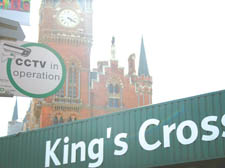|
|
 |
| |

A sign informs the public they are being watched |
Why we must keep an eye on the rise of surveillance society
Governments and corporations are collecting more and more information about us, putting question marks over our civil liberties, writes Christopher Price Order this Book
SURVEILLANCE Unlimited is about eavesdropping.
It paints a scary, futuristic scenario of how the exact habits, preferences and characteristics of every citizen can now be collected and sold to governments and the new data development corporations – the governments purporting to use the data to protect us from terrorism and the corporations harvesting data on the lifestyle preferences of every citizen in order to sell it on to companies who decide what products they should be manufacturing and marketing.
Governments want this data because they think voters care little about eavesdropping; and the companies hope that with the right sort of sales pitch they can boost sales to particular groups of customers.
Future generations may see this “surveillance” industry as a thieves’ kitchen specialising in identity theft, collusively funded by the taxpayer and the corporate retail trade.
Today genuine thieves – in the shape of international organised crime – are breaking into this kitchen and turning new identity cards to their own advantage. By staying one step ahead of governments in the technology they learn how to forge phoney ones. It is not yet at all clear whether or not the forces of good will be the winners in this new IT war.
In some parts this is a book for 11 to 35-year-old computer nerds. We are dragged through the minutiae of RFID (Radio Frequency Identification), of Silkworth (the computer at the US spy station at Menwith Hill near Harrogate) and of its algorithms which use Voicecast, Magistrand and Pathfinder to comb through texts and phrases used by anyone – innocent or guilty – anywhere in the world.
The heartening news, for most of us, is that not all of this surveillance gear is particularly reliable and causes interesting miscarriages of justice in the US. California has a traffic police system called Livescan which stores fingerprints, each with an EFC (electronic fingerprint card) and an FPN (unique fingerprint control number) and then shares its FPNs with other states.
So a Mr Benson wound up in jail in Oregan because he had been stopped on a freeway in California. Livescan had given two people the same FPN by accident. (At least he was able to pick up $300,000 in damages.)
But the unreliability could run very deep. Livescan’s manufacturer Indentix has a BPA (blanket purchase agreement) with the US Department of Homeland Security for fingerprint systems.
Chapter three in the book, entitled “Big Brother Has Always Been Watching You”, gets down to the long pedigree of surveillance – from Moses sending out spies to find out how easy Canaan will be to colonise, to the KGB running the Soviet Union. But Laidler does not cover in any detail the UK legislative story in this area.
Ralph Nader, in the US in the 1960s, saw the problem of a technological all-powerful state and, after Watergate, led a successful fight to embed a tough Freedom of Information Act in US law to keep it at bay.
His campaign triggered a similar one in the UK and, eventually, the Freedom of Information Act was passed at the turn of the century. It produced an information commissioner regulator whose job it is to balance the imperatives of the open government against those of individual privacy. Now this careful legal settlement has been thrown into chaos by the Counter-Terrorism Bill currently before parliament and the revelation that Sadiq Kahn, the Labour MP for Tooting, was bugged by the security services.
The Counter-Terrorism Bill is overtly designed to overwrite the common law “Duty of Confidentiality” – one of the basic guarantees of privacy for the citizen – and covertly to rewrite the (Harold) Wilson “Doctrine” that no agency, however privileged, is allowed to bug an MP going about his parliamentary business.
The whole point of the courts and parliament is that they are open-government forums which no minister can censor.
The new bill provides for the use of DNA samples and fingerprinting to be used not just for terrorism or even ordinary crime, but also for general “identification” purposes.
If it becomes law in its present form, the balance between privacy and openness is going to shift to the benefit of government.
But it is worse than this. The basis of the Freedom of Information Act was that public institutions, directly funded by the taxpayer, should control the flow of information and come clean about what they do with it. But much of the information which governments collect and use and compare to survey and interfere with individual privacy is wholly dependent on a technology many civil servants neither control nor understand.
The large private corporations, in league with government security services hold the whip hand.
It is not yet clear how the US Department of Homeland Security or the UK Home Office can be relied on to keep terrorism at bay and maintain civil liberty. If nations want both these goals, they will need to take far tighter control over the almost wholly privatised technological surveillance industry.
Otherwise the maintenance of freedom and democracy will not be in the hands of any US president or UK prime minister, but of this new private Big Brother.
|
 |
|
 |
 |
|
 |
|



